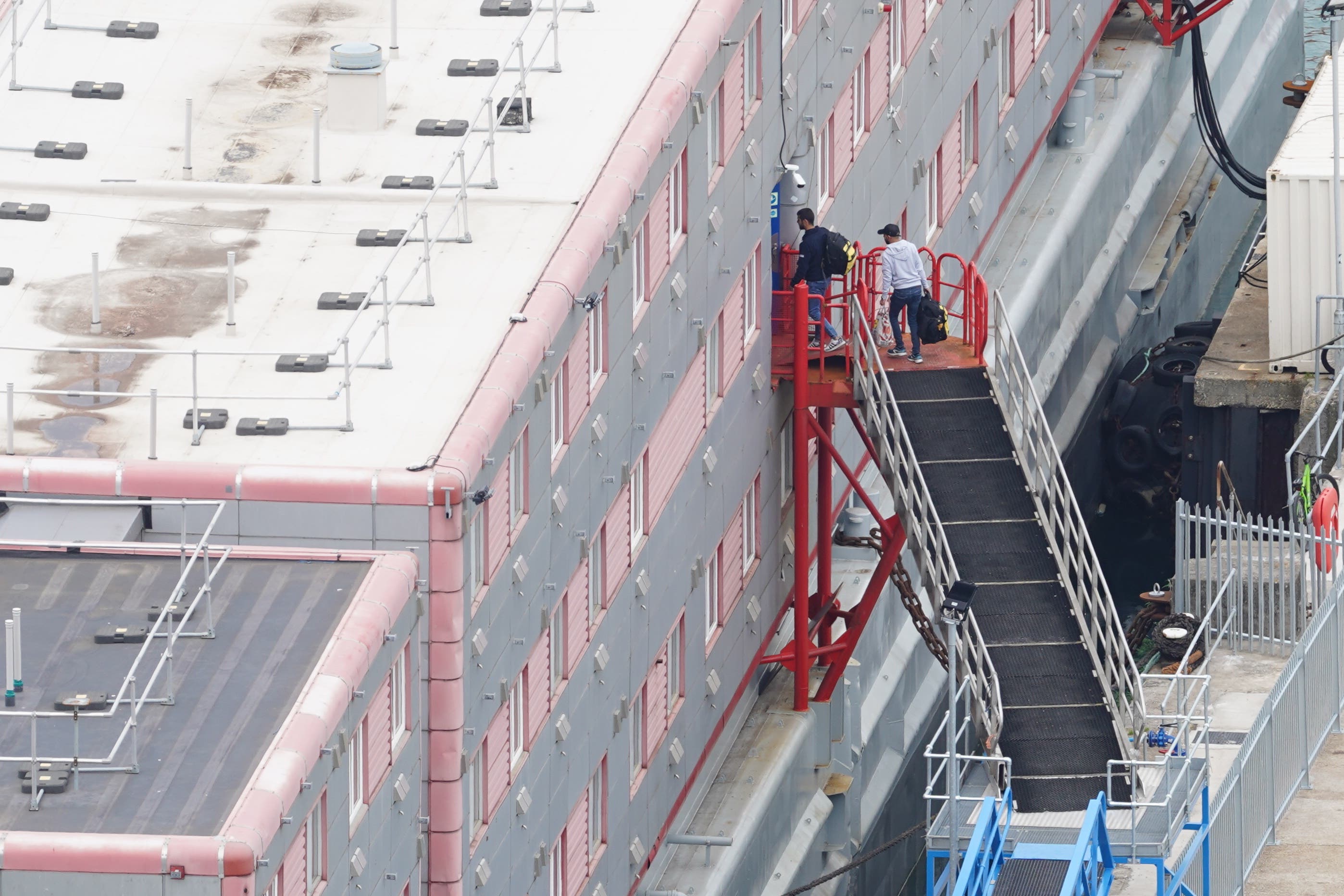Lessons may be learned after Legionella detection on asylum seeker barge – No 10
The Government is standing by the use of barges to house migrants, amid a blame game about the response to the situation on the Bibby Stockholm.

Ministers may need to learn lessons from the Bibby Stockholm incident, No 10 said, after asylum seekers were removed from the barge after traces of Legionella bacteria were found.
The Government is standing by the use of barges to house migrants, amid a blame game about the response to the situation following the detection of the dangerous bacteria.
Downing Street on Monday insisted that the Prime Minister retained confidence in Home Secretary Suella Braverman, as questions continue to be asked about when Home Office officials were first informed.
The Government has said that Home Office ministers were not told about the situation until the night of August 10, despite claims a local council told the contractors running the vessel about test results on August 7 – the day migrants boarded the barge.
The discovery eventually led to the removal on August 11 of all 39 people who had boarded the floating accommodation docked in Portland, Dorset.
Tory-run Dorset Council said it informed the “responsible organisations”, barge operators CTM and Landry & Kling, about the preliminary test results on Monday August 7 – the same day it received them.
A Home Office official was then told about the discovery on August 8, the council said.
The Prime Minister’s official spokesman said ministers only became aware of the issue on August 10 but said that the Home Office was still “clarifying” if officials may have been aware earlier.
“I think we will be communicating with all relevant groups to see if there are any lessons that can be learned, as you would expect in any public health situation,” he said.
“We remain confident that we have acted quickly once informed.”
Legionella was detected in a sample analysed by the UK Health Security Agency (UKHSA) on behalf of Dorset’s environmental health team.
UKHSA chief Dame Jenny Harries said the initial findings did not require a response by her agency as it could be that there were environmental factors which did not mean there was a public health risk.
But she said the local health protection team was alerted on the night of August 9 and she was informed first thing on August 10 when the UKHSA “jumped in immediately”.
The migrants moved on to Bibby Stockholm on August 7, the start of the Government’s “small boats week” policy blitz aimed at showing they were tackling the problems of migrants crossing the English Channel and the backlog in the asylum system.
It now remains unclear when the asylum seekers will return to the barge, with Downing Street refusing to give a timeline as officials await the result of further tests.
The spokesman for Mr Sunak, who has returned from his holiday in California, said that barges remain an “appropriate way to find alternative accommodation to hotels”.
Asked on BBC Radio 4’s Today programme whether asylum seekers should have been allowed to board before the test results came back, Dame Jenny said “we would always, in public health terms, want places as safe as possible”.
She said the Home Office acted to remove the asylum seekers from the vessel as a precaution before a recommendation to do so.
Dorset Council defended its handling of the situation.
A spokesman said: “To be clear, it was not Dorset Council’s responsibility to inform the Home Office – that responsibility sat with CTM and Landry & King, the companies contracted by the Home Office to operate the barge.”
Labour leader Sir Keir Starmer insisted that housing migrants on barges, in hotels or disused military air bases was not a solution to the “broken” asylum system.
But he was unable to rule out an incoming Labour government maintaining their use in response to the situation it would inherit on taking office.
“I don’t want to keep barges or hotels or airfields, for that matter,” he told reporters in Scotland.
“Now, we’re going to inherit a very difficult situation and so we’re going to have to manage as best we can.”
Meanwhile, there were further signs of activity in the English Channel on Monday following large numbers of migrants making the crossing in recent days.
More than 1,600 people were detected making the journey from France across Thursday to Saturday last week according to provisional Home Office figures, although there were no recorded crossings on Sunday.
At least six people died and dozens were rescued after a boat got into difficulty off the coast of Sangatte, northern France, on Saturday.
Subscribe to Independent Premium to bookmark this article
Want to bookmark your favourite articles and stories to read or reference later? Start your Independent Premium subscription today.
